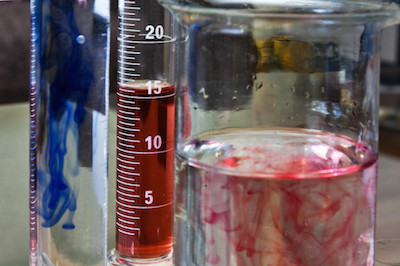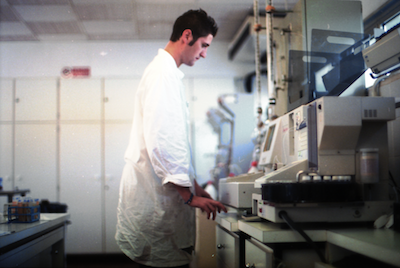
via Flickr User Horia Varlan
In a basic sense, Chemistry is the study of matter. Understanding how it behaves, what it’s made of, and what properties it has are the chief goals of those that study chemistry. While the better part of their work might take place in a sealed lab, working with microscopic atoms and particles, the influence of chemistry is all around us, from the water we drink to the medicines that keep us alive. In this way, chemistry is really a study of life processes, and in coming to understand the building blocks that make up our chemistry, chemists cultivate a great understanding of the way our physical world functions. While many chemistry majors go on to do some form of postgraduate study or use chemistry as a vehicle to work towards a medical degree, there are also many jobs attainable for those fresh out of the gate.
About 25,000 degrees in the physical sciences (chemistry and physics) were given in the 2010-11 academic year of the 1.72 million total.
About 25% of chemistry graduates go on to work in a directly related field, and most fall under the private, for-profit industry.
The job outlook for most chemistry-related jobs is listed as good to normal, and most of these positions are well-paying and accessible with a bachelor’s degree. However, some of the higher-paying fields, such as dentistry, pharmacy, and radiology, require years of postgraduate study.
The bulk of the work performed as an undergraduate chemistry major involves experimentation and the scientific process. The chief aim of these experiments and labs that are part and parcel of graduating with a degree in chemistry is to make observations in the physical world, create a hypothesize, and then craft an experiment to test your theory. These experiments are precise and controlled – while still requiring a high degree of creativity and ingenuity to conceptualize – and necessitate a great attention to detail on the part of the student. However, experiments are followed by processes of critical thinking and analysis in order to draw meaningful conclusions from the data collected during an experiment.
In this way, students of chemistry also learn to speak and write rather efficiently. While their main focus is on the experiments themselves, the process of pulling findings from empirical data requires an ability to, first of all, write a conclusive report of the results of an experiments and second, often presents what you have found. The data derived from chemistry experiments is often complex and highly scientific, and the ability to synthesize these findings into written and spoken word is a hugely marketable skill for chemistry majors.
The problems solved by chemistry students often require a working knowledge of mathematical concepts, from simple algebra, applied to some of the introductory topics of chemistry such as balancing chemical equations, to more complex calculus principles such as working knowledge of differential equations necessary to understand topics such as thermodynamics. While mathematics is a required skill to have in order to graduate as a chemistry major – and especially to move on towards graduate studies and medical school – these skills can also help to round out your resume and could help you land a job such as a chemical engineer.
In the modern day, the worlds of chemistry and computing are becoming increasingly intermingled. From typing lab reports to modeling hypothetical outcomes and creating visual representations of data, chemistry students will come to be quite familiar with computers and the range of related software tools.
Finally, chemistry students often collaborate and work in teams and as such cultivate great interpersonal skills and abilities to work efficiently as members of a multi-faceted team.
Chemist
Media Pay: $52,000
It doesn’t take a stretch of the imagination to envision a recent chemistry graduate landing an entry-level job as a chemist. While this position can span many different industries, those who work as chemists will employ the very same skill set learned as an undergraduate in their day-to-day employment responsibilities. Entry-level chemistry jobs will often see one working as a member of a team to hypothesize, test, and draw conclusions. They may collaborate with people who specialize in other science-related fields, and especially in today’s world, utilize the computing power available to help where applicable.

via Flickr User Matteo Bagnoli
Lab Technician
Median Pay:$34,000
Positions in laboratories as lab technicians may also be a great fit for a newly-graduated chemistry student looking for an entry-level job. As a lab tech, you will likely run tests, process samples, ensure the cleanliness and efficacy of lab equipment, and prepare lab reports. With four years of experimental exposure underneath your belt, the duties of a lab technician fall easily within the range of abilities held by most undergraduate chemistry students. While you might not be coming up with your own experiments, lab technician positions can be catalysts for further employment within a given field or company, and provide great hands-on exposure to hone your skills.
Registered Nurse
Median Pay:$80,000
The role of registered nurses is often misunderstood and under-appreciated within the hospital. Fulfilling a wide range of duties, from assessing and diagnosing patients to planning courses of recovery and evaluating test results, the work of an RN can be multi-faceted, well-paying, and hugely gratifying. In addition, time working as an RN may shed light on whether a chemistry student would enjoy working in medicine down the road and whether or not medical school is a good idea.
The most important thing a chemistry major can do is to gain experience and exposure performing outside of the classroom. Internships with schools, hospitals, or labs not only provide great real-world experience, but can be huge in bolstering a resume and gaining connections within a given field.
| Nuclear Medicine Technologist OhioHealth Columbus, OH | View |
| SC32P2 Information Scientist - Synthetic Chemist / Natural Product Chemist CAS Columbus, OH | View |
| Nuclear Medicine Tech OhioHealth Columbus, OH | View |
| SC32P2 Information Scientist- Organic/Biological Chemist CAS Columbus, OH | View |
| Product Development Chemist Franklin International Columbus, OH | View |
| Senior Production Manager Smart4Chemicals Columbus, OH | View |
| Travel Laboratory Technician - $1,536 per week Mount Carmel Grove City Grove City, OH | View |
| Lab Helper Battelle Memorial Institute West Jefferson, OH | View |
| Risk & Quality Performance Manager (Remote) Molina Healthcare Columbus, OH | View |
| Corporate -Associate Chemist Essilor of America Lockbourne, OH | View |